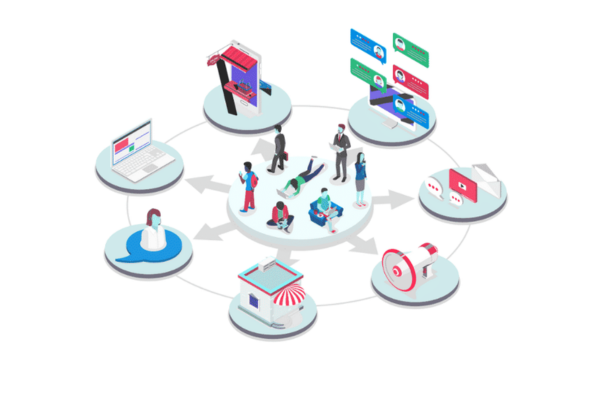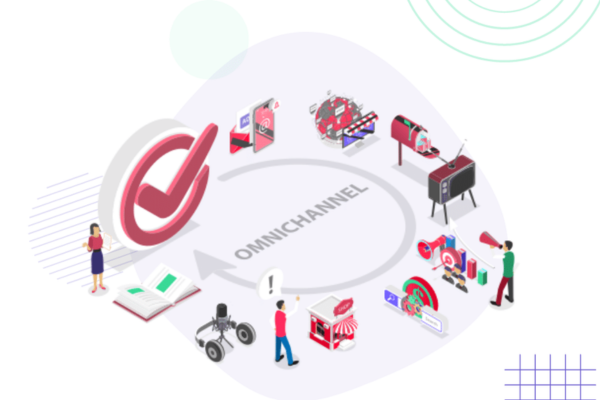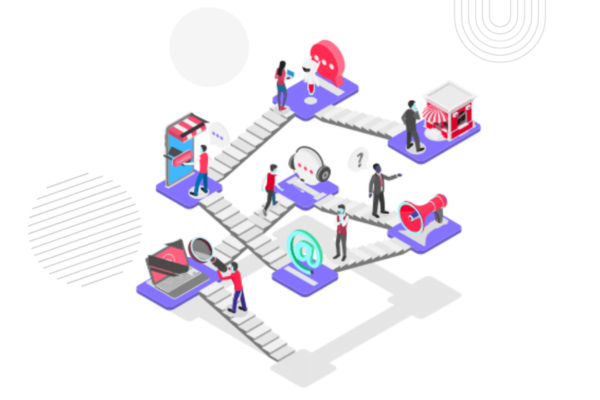Understanding Omnichannel Communication: Meeting Clients Where They Are
by Shahnawaz Alam Sales & Marketing Published on: 14 January 2025 Last Updated on: 07 May 2025

Omnichannel communication is the cornerstone of any successful relationship, especially in the insurance industry.
With clients expecting seamless interactions across multiple channels, insurance agencies are facing the need to adapt their communication strategies. The strategy? Well, agencies have to adopt several different social channels for all round communication.
For example, if your clients are on Facebook, your business has to be on Facebook. It applies to every other social media and channel of communications you can name – Instagram, Skype, Phone calls, Outlook – and any other platforms you can name.
But what exactly is omnichannel communication, and why is it critical for insurance agencies today? Read this blog post. We have answered all the possible questions you may have about this..
What Is Omnichannel Communication?

Omnichannel communication refers to an integrated approach where clients can interact with a business across multiple platforms while receiving a consistent and cohesive experience.
When we use the term omnichannel, we don’t mean a bunch of channels for your clients to reach out to you. On the contrary, it’s a clear and unified ecosystem where all the channels of communication are in sync. With this type of ommunication, your clients can reach out at any moment from any device, using any platform.
For instance, a client might start a conversation with an insurance agent via email, continue it over a phone call, and finalize the process through a self-service portal. With omnichannel communication, the transition between these channels is seamless, as all relevant information is retained and accessible across each touchpoint.
In the context of insurance, this approach enables agencies to stay responsive to the evolving needs of their clients while maintaining a personalized and efficient service.
Why is Omnichannel Communication Important for Insurance Agencies?
Insurance agencies and the landscape of insurance management are changing. It’s evolving faster than we can imagine, and we have technology to thank for that. And communication is always at the forefront of things impacted by the change.
Clients today value convenience and accessibility more than ever before. They expect their insurance provider to be available on their preferred communication channel, whether that’s via a phone call, text message, or online chat.
Here’s why embracing omnichannel communication is no longer optional for insurance agencies:
1. Better Client Experience
Omnichannel communication creates a more seamless and enjoyable experience for clients. By eliminating the need for clients to repeat themselves or re-explain their issues on different platforms, agencies demonstrate attentiveness and professionalism. This helps build trust and fosters long-term client relationships.
2. Easier to Manage Operations
Having an interconnected system allows insurance agencies to streamline workflows and manage their processes more effectively. When agents have access to a complete view of client interactions across all channels, they can respond more quickly and accurately to inquiries. This is particularly useful when managing tasks like policy renewals, claims processing, or providing tailored recommendations.
3. Personalized Communication
Personalization is no longer just a bonus—it’s an expectation. Omnichannel communication enables agencies to deliver personalized interactions based on a client’s history, preferences, and current needs. By using insights gathered from previous touchpoints, agents can provide relevant solutions that demonstrate a deeper understanding of the client’s situation.
4. Competitive Advantage
The ability to provide a seamless and unified communication experience can set an agency apart in a crowded market. Clients are more likely to stick with an insurer who understands their preferences and interacts with them easily across various platforms.
Key Aspects of Omnichannel Communication for Insurance Agencies

Adopting few technologies isn’t enough to start omnichannel communication for a business or an insurance agency. It has to be a strategic decision. Users must ensure that all the channels are connected and functioning seamlessly without any difficulties. Here’s how to implement it –
1. Centralized Data Management
To deliver a seamless experience, it’s critical to have a centralized system where client information is stored and updated in real-time. This ensures that agents and automated tools have access to accurate and up-to-date client records, no matter the channel being used.
For instance, agencies that use integrated software solutions to manage your insurance agency can achieve this level of data synchronization, enabling smoother client interactions.
2. Consistent Branding and Messaging
Whether a client is engaging through a mobile app, social media, or a phone call, the tone and messaging should feel consistent. This uniformity builds credibility and reinforces the agency’s identity.
3. Channel Integration
True omnichannel communication depends on the seamless integration of all platforms, such as email, SMS, live chat, and self-service portals. Clients should feel that they are interacting with one cohesive system rather than disconnected silos.
4. Analytics and Feedback
Collecting data on client interactions can reveal patterns and preferences that agencies can use to refine their strategies. Additionally, gathering client feedback across all channels helps identify areas for improvement, ensuring continuous optimization.
Challenges and How to Overcome Them
While the benefits of omnichannel communication are clear, implementing it comes with challenges:
- Technology Gaps: Some agencies may lack the infrastructure needed to support integrated systems. Investing in robust tools to manage your insurance agency can bridge this gap.
- Training Needs: Employees must be trained to use new systems effectively and provide consistent service across all channels.
- Data Privacy Concerns: With increased data sharing across platforms, agencies must prioritize data security and comply with regulations.
These challenges can be mitigated by adopting scalable, user-friendly systems and fostering a culture of adaptability within the agency.
The Future of Omnichannel Communication in Insurance
As digital transformation continues, omnichannel communication will only grow in importance. Clients will expect even more from their insurance providers, including AI-driven chatbots for instant support and enhanced self-service options. Agencies that prioritize an omnichannel approach will be better positioned to adapt to these shifts and maintain a competitive edge.
By adopting omnichannel communication and leveraging tools that help manage your insurance agency, insurers can deliver better client experiences, improve operational efficiency, and stay ahead in an increasingly connected world.
In conclusion, meeting clients where they are is not just a convenience; it’s a necessity. Omnichannel communication ensures that insurance agencies can cater to modern client expectations while maintaining the personal touch that sets them apart.
Also read


































































































